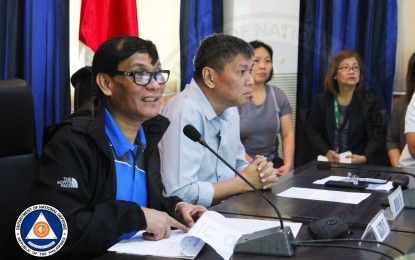
TASK FORCE. During a council meeting in Legazpi City on Tuesday (Feb. 4, 2020), Claudio Yucot (left), Regional Disaster Risk Reduction Management Council (RDRRMC)-Bicol chairman and Dr. Ernie Vera, Department of Health-Bicol regional director, discuss the contingency plan that they would implement in the event the novel coronavirus enters the region. The RDRRMC also on Tuesday approved a resolution creating a task force that will prevent the spread of nCoV in Bicol. (Photo courtesy of OCD-5)
LEGAZPI CITY -- The Regional Disaster Risk Reduction Management Council (RDRRMC) of Bicol on Tuesday approved a resolution creating a task force on the novel coronavirus (nCoV).
During a meeting, Claudio Yucot, RDRRMC chairman and concurrent Office of Civil Defense (OCD) regional director, said the task force will formulate a contingency plan that will implement programs to address any public health issues in the event nCoV enters Bicol.
The task force, he added, will be chaired by Department of Health (DOH) regional director, Dr. Ernie Vera.
“The task group would also draw up a worst-case scenario action plan to contain the spread of the virus once cases are detected in Bicol,” Yucot said.
He said the situation calls for an interagency effort where manpower, facilities, and fund would be utilized in an integrated manner focused on preventing the spread of the disease.
“In a unified manner, we can facilitate and help arrest this serious health concern that we might encounter. Let’s hope that the worst-case scenario would not happen,” Yucot added.
Measures to be implemented for a worst case scenario include the setting up of quarantine, lock-down of areas affected by the virus, massive monitoring of travelers that arrive from other regions in airports, bus terminal and seaports including places of convergence such as malls, schools and other public places, holding of information drives at the barangay levels, and provision of medical assistance to visitors affected by the virus.
Vera, also during the meeting, said that initially, there will be three hospitals in Bicol that would be used as referral centers to admit and examine transient persons who are suspected to have contracted the nCoV.
These facilities are the Bicol Regional Training and Teaching Hospital (BRTTH) here, the Bicol Medical Center (BMC) in Naga City and the Bicol Sanitarium in Cabusao town in Camarines Sur.
Vera said the BRTTH would admit persons under investigation (PUIs) for the virus from the provinces of Albay, Sorsogon, and the island provinces of Masbate and Catanduanes while the BMC would receive PUIs from Camarines Sur and Camarines Norte.
The Bicol Sanitarium, on the other hand, will receive serious cases and be used as an alternative center in case the two other referral hospitals are already congested.
Meanwhile, Albay Gov. Al Francis Bichara said as a preventive measure against nCoV, the province will purchase four thermal scanners to be placed at the Legazpi Domestic Airport, the Legazpi Grand Bus terminal and in two other places where big crowds converge. (PNA)
